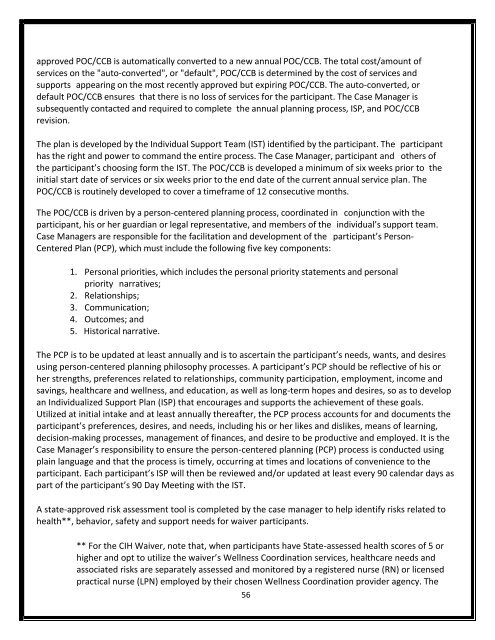DDRS Waiver Manual
2dXf5Pj
2dXf5Pj
You also want an ePaper? Increase the reach of your titles
YUMPU automatically turns print PDFs into web optimized ePapers that Google loves.
approved POC/CCB is automatically converted to a new annual POC/CCB. The total cost/amount of<br />
services on the "auto-converted", or "default", POC/CCB is determined by the cost of services and<br />
supports appearing on the most recently approved but expiring POC/CCB. The auto-converted, or<br />
default POC/CCB ensures that there is no loss of services for the participant. The Case Manager is<br />
subsequently contacted and required to complete the annual planning process, ISP, and POC/CCB<br />
revision.<br />
The plan is developed by the Individual Support Team (IST) identified by the participant. The participant<br />
has the right and power to command the entire process. The Case Manager, participant and others of<br />
the participant’s choosing form the IST. The POC/CCB is developed a minimum of six weeks prior to the<br />
initial start date of services or six weeks prior to the end date of the current annual service plan. The<br />
POC/CCB is routinely developed to cover a timeframe of 12 consecutive months.<br />
The POC/CCB is driven by a person-centered planning process, coordinated in conjunction with the<br />
participant, his or her guardian or legal representative, and members of the individual’s support team.<br />
Case Managers are responsible for the facilitation and development of the participant’s Person-<br />
Centered Plan (PCP), which must include the following five key components:<br />
1. Personal priorities, which includes the personal priority statements and personal<br />
priority narratives;<br />
2. Relationships;<br />
3. Communication;<br />
4. Outcomes; and<br />
5. Historical narrative.<br />
The PCP is to be updated at least annually and is to ascertain the participant’s needs, wants, and desires<br />
using person-centered planning philosophy processes. A participant’s PCP should be reflective of his or<br />
her strengths, preferences related to relationships, community participation, employment, income and<br />
savings, healthcare and wellness, and education, as well as long-term hopes and desires, so as to develop<br />
an Individualized Support Plan (ISP) that encourages and supports the achievement of these goals.<br />
Utilized at initial intake and at least annually thereafter, the PCP process accounts for and documents the<br />
participant’s preferences, desires, and needs, including his or her likes and dislikes, means of learning,<br />
decision-making processes, management of finances, and desire to be productive and employed. It is the<br />
Case Manager’s responsibility to ensure the person-centered planning (PCP) process is conducted using<br />
plain language and that the process is timely, occurring at times and locations of convenience to the<br />
participant. Each participant’s ISP will then be reviewed and/or updated at least every 90 calendar days as<br />
part of the participant’s 90 Day Meeting with the IST.<br />
A state-approved risk assessment tool is completed by the case manager to help identify risks related to<br />
health**, behavior, safety and support needs for waiver participants.<br />
** For the CIH <strong>Waiver</strong>, note that, when participants have State-assessed health scores of 5 or<br />
higher and opt to utilize the waiver’s Wellness Coordination services, healthcare needs and<br />
associated risks are separately assessed and monitored by a registered nurse (RN) or licensed<br />
practical nurse (LPN) employed by their chosen Wellness Coordination provider agency. The<br />
56


